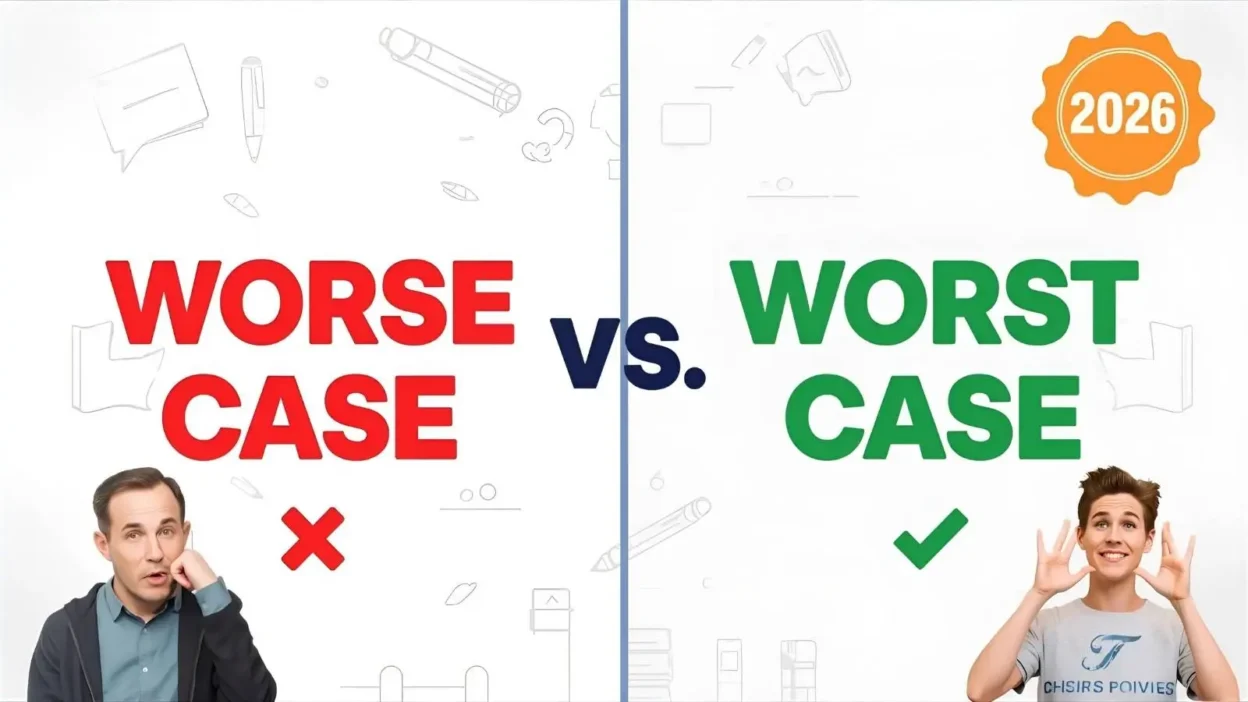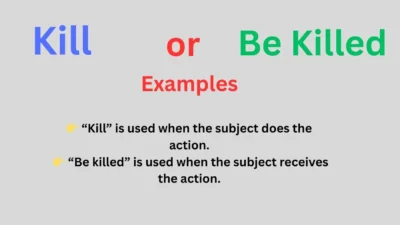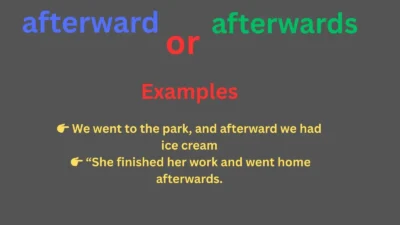I get it — you’ve seen both “worse case” and “worst case” and now you’re wondering which one is correct.
Don’t worry, I’ve been there too! If you want to sound confident in your writing or emails, this guide clears up the confusion once and for all.
By the end, you’ll know when to use worst case, when worse fits, and why the mix-up happens so often.
⚡ Worse Case or Worst Case – Quick Answer
✅ The correct phrase is “worst case.”
It means the most extreme or most serious possible situation.
Example: “In the worst case, we’ll have to delay the project.”
❌ “Worse case” is grammatically incorrect because worse is a comparative adjective (used to compare two things), while worst is a superlative adjective (used for the highest degree).
👉 Correct: In the worst case scenario, we’ll lose a few days.
👉 Incorrect: In the worse case scenario, we’ll lose a few days.
📜 The Origin of “Worst Case”
The phrase “worst case” comes from the mid-20th century term “worst-case scenario.”
It originated in military and risk analysis, describing the most severe possible outcome.
Over time, it became popular in business, technology, and everyday speech to express contingency planning — thinking about what could go wrong.
The confusion with “worse case” happens because both words — worse and worst — are related forms of bad:
- Bad → worse → worst
So while worse compares, worst defines the ultimate extreme.
🇬🇧🇺🇸 British English vs American English Spelling
Interestingly, there’s no spelling difference between “worst case” in British and American English.
Both use the same phrase.
However, British writers might say “in the worst case”, while Americans often say “in the worst-case scenario.”
| Region | Common Usage | Example |
|---|---|---|
| 🇺🇸 American English | worst-case scenario | In the worst-case scenario, the flight may be canceled. |
| 🇬🇧 British English | in the worst case | In the worst case, we can reschedule. |
| 🇦🇺 Australian English | worst-case scenario | The worst-case scenario is still manageable. |
So whichever side of the Atlantic you’re on, the rule stays the same — “worst case” wins every time.
🧭 Which Spelling Should You Use?
If you’re writing for a global audience, always use “worst case.”
It’s universally accepted in academic, business, and professional writing.
For casual speech or social media, people might still say “worse case” — but that’s just a slip, not standard English.
👉 Use worst case for resumes, reports, and essays.
👉 Avoid worse case, even if it sounds okay when spoken.
⚠️ Common Mistakes with “Worse Case” or “Worst Case”
Here are a few slip-ups I often see (and how to fix them):
| ❌ Wrong | ✅ Correct |
|---|---|
| In the worse case, we’ll lose money. | In the worst case, we’ll lose money. |
| That’s the worse-case scenario. | That’s the worst-case scenario. |
| It can’t get any worse case than this. | It can’t get any worse than this. (Drop “case.”) |
| Our worse case was last year. | Our worst case was last year. |
💡 Tip: If you’re describing the most extreme situation — always think worst.
✍️ “Worst Case” in Everyday Examples
You’ll see “worst case” everywhere — from emails to news headlines.
📧 Emails:
“In the worst case, we might need to postpone the launch.”
📰 News:
“Officials are preparing for the worst-case scenario amid heavy rainfall.”
💬 Social Media:“Worst case, I’ll just order pizza 🍕.”
🎓 Formal Writing:
“In the worst-case scenario, economic growth could decline by 2%.”
It’s flexible and fits casual and formal tones alike.
📈 “Worse Case or Worst Case” – Google Trends & Usage Data
According to Google Trends, searches for “worse case or worst case” spike regularly as people double-check grammar before professional writing or exams.
Globally, “worst case” dominates — over 95% of total usage.
Top countries using it correctly include the US, UK, Canada, and Australia.
| Phrase | Popularity | Correctness |
|---|---|---|
| Worst case | ⭐⭐⭐⭐⭐ | ✅ Correct |
| Worse case | ⭐ | ❌ Incorrect |
| Worst-case scenario | ⭐⭐⭐⭐ | ✅ Common variant |
| Worse-case scenario | ⭐ | ❌ Error |
So, it’s clear — worst case rules in every “case.” 😄
FAQs
1. Is it “worse case” or “worst case scenario”?
✅ Always say “worst case scenario.” “Worse case” is grammatically incorrect.
2. Why do people confuse them?
Because worse and worst sound similar and both come from bad.
3. Can I ever use “worse case”?
Only if you literally mean a case that is worse than another. Example: “This legal case is worse than the last one.”
4. What’s another way to say “worst case”?
Try synonyms like toughest situation, dire scenario, or bleakest outcome.
5. Is “worst case” formal?
Yes, it’s fine for professional and academic writing.
6. Should I hyphenate it?
Use a hyphen only when it’s before a noun — “worst-case scenario.”
7. How can I remember the difference?
Think: Bad → worse → worst. The worst is always the lowest or most extreme.
🎯 Conclusion
So, the worse case or worst case debate ends here — “worst case” is the right choice every single time.
It’s grammatically correct, globally understood, and fits both casual and professional writing.
Next time you’re in doubt, just remember: “Worse” compares; “worst” defines the extreme. Simple! 💡



